牛津深圳版英语七年级上册 Module 3 Unit 5 Visiting the moon 课时3 语法课件 (共18张PPT)
文档属性
| 名称 | 牛津深圳版英语七年级上册 Module 3 Unit 5 Visiting the moon 课时3 语法课件 (共18张PPT) | 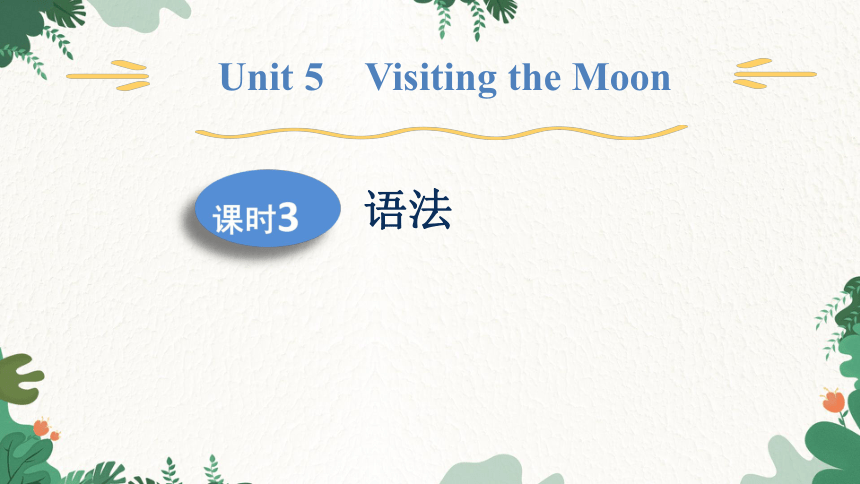 | |
| 格式 | pptx | ||
| 文件大小 | 2.2MB | ||
| 资源类型 | 教案 | ||
| 版本资源 | 牛津深圳版 | ||
| 科目 | 英语 | ||
| 更新时间 | 2023-07-25 08:52:56 | ||
图片预览

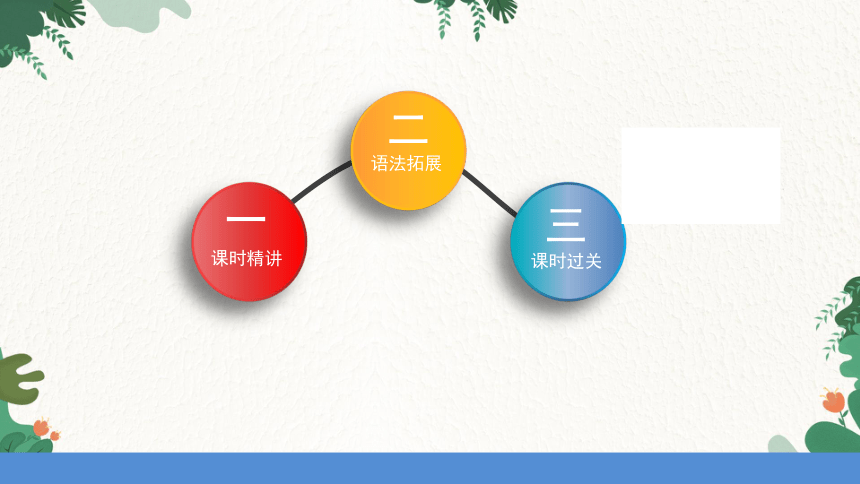
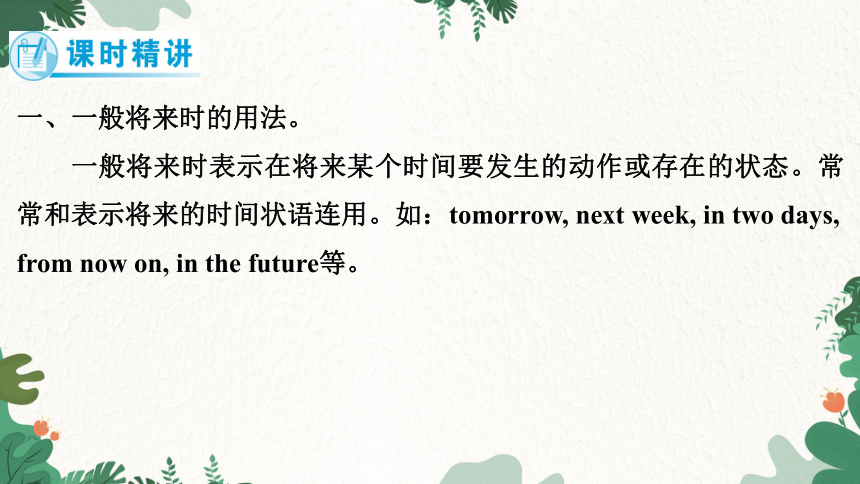
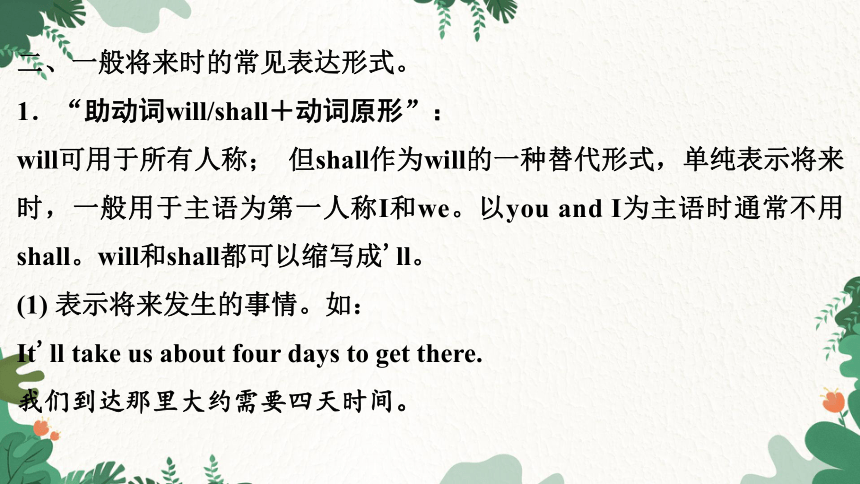
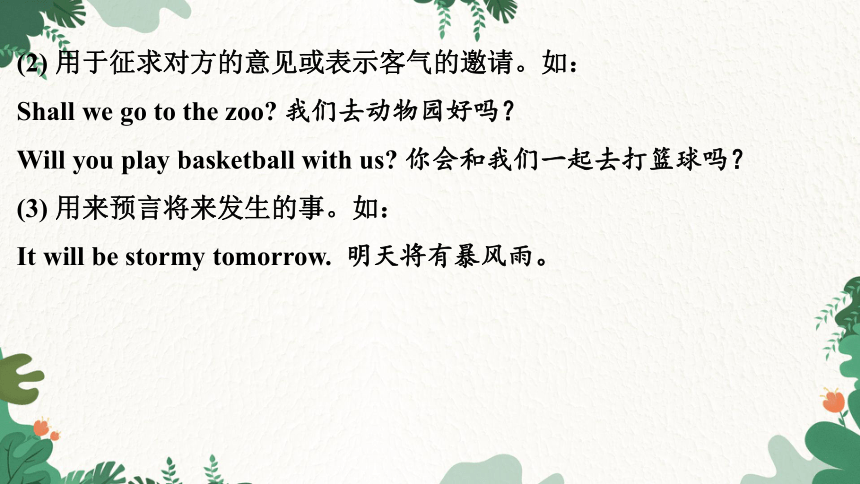
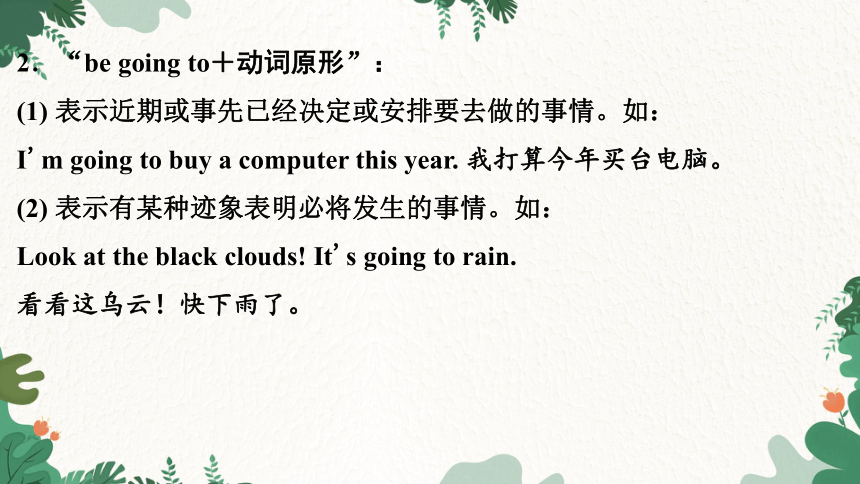
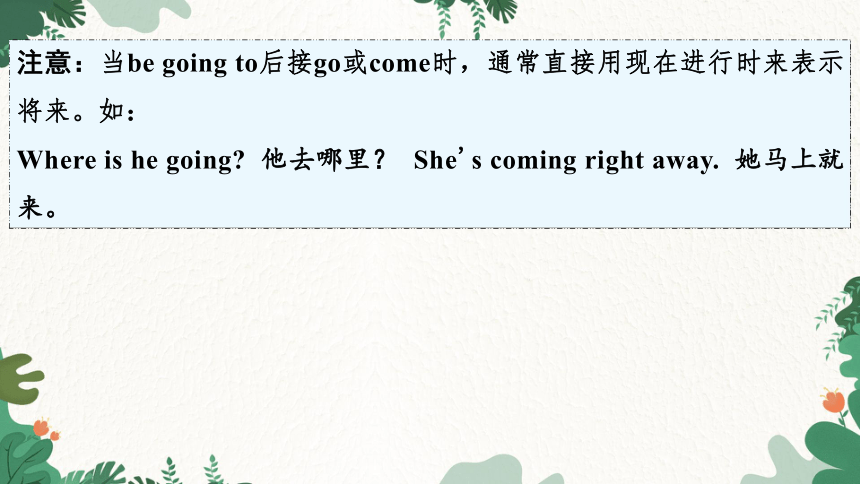
文档简介
(共18张PPT)
Unit 5 Visiting the Moon
课时3
语法
一
课时精讲
二
语法拓展
三
课时过关
一、一般将来时的用法。
一般将来时表示在将来某个时间要发生的动作或存在的状态。常常和表示将来的时间状语连用。如:tomorrow, next week, in two days, from now on, in the future等。
二、一般将来时的常见表达形式。
1.“助动词will/shall+动词原形”:
will可用于所有人称; 但shall作为will的一种替代形式,单纯表示将来时,一般用于主语为第一人称I和we。以you and I为主语时通常不用shall。will和shall都可以缩写成'll。
(1) 表示将来发生的事情。如:
It'll take us about four days to get there.
我们到达那里大约需要四天时间。
(2) 用于征求对方的意见或表示客气的邀请。如:
Shall we go to the zoo 我们去动物园好吗?
Will you play basketball with us 你会和我们一起去打篮球吗?
(3) 用来预言将来发生的事。如:
It will be stormy tomorrow. 明天将有暴风雨。
2.“be going to+动词原形”:
(1) 表示近期或事先已经决定或安排要去做的事情。如:
I'm going to buy a computer this year. 我打算今年买台电脑。
(2) 表示有某种迹象表明必将发生的事情。如:
Look at the black clouds! It's going to rain.
看看这乌云!快下雨了。
注意:当be going to后接go或come时,通常直接用现在进行时来表示将来。如:
Where is he going 他去哪里? She's coming right away. 她马上就来。
三、一般将来时基本句型。
句型 will+动词原形 be going to+动词原形
特别词 will 特别词 am/is/are
肯定句 She will have a picnic tomorrow. She is going to plant trees tomorrow.
否定句 She will not have a picnic tomorrow. She is not going to plant trees tomorrow.
一般疑问句及回答 — Will she have a picnic tomorrow — Yes,she will./No,she won't. — Is she going to plant trees tomorrow
— Yes,she is./No,she isn't.
特殊疑问句 What will she do tomorrow? What is she going to do tomorrow?
1.用现在进行时表示将来的用法。
(1) 表示最近的确切安排,即根据计划或安排在近期内将要发生的动作。这是表示眼前的打算最普通的说法,但一般要与表示将来的时间连用,以避免现在进行时和一般将来时之间在含义上可能出现的混淆。如:
I'm meeting you at the airport at that time. 到时候我会到机场接你。
What are you having for dinner 你晚饭准备吃些什么?
(2) 表示从一个地方到另一个地方位置移动的动词 (如go, come, drive, fly, travel, arrive, leave, visit,run,return等),表示开始、结束的动词 (如start,begin,finish,end等),表示位置的动词 (如stay,remain等),以及动词do等的现在进行时形式,可以用来表示没有确定安排的决定或计划,此时不一定要和表示将来的时间连用。如:
He's driving to Ji'an tomorrow. 他明天驾车去吉安。
What are you doing next 接下来你要干什么?
2.there be句型的将来时:There will be… = There is going to be… 表示“将会有……” 如:
There will be a sports meeting next month. 下个月将有一场运动会。
= There is going to be a sports meeting next month.
3.在时间、条件状语从句中,将来时的用法:主将从现。即“主句用一般将来时, 从句用一般现在时”。如:We will go out to play if it doesn't rain tomorrow.
明天如果不下雨, 我们就出去玩。 (条件状语从句)
I will come to see you when I come back. 我一回来就来看你。 (时间状语从句)
一、完成句子,每空一词。
1.李先生明天什么时候抵达这里?
When _______ Mr. Li _________ here tomorrow
2.他将不会再写信给我。
He _________ _______ to me anymore.
3.他两天后会参加这个会议吗?
_______ he _______ ______ _____ the meeting in two days
will
arrive
won't write
Will
take part in
4.他们这个周末去野餐。
They _____ _______ ____ have a picnic this weekend.
5.我不打算成为一个公交车司机。
I _____ ______ ________ ____ ____ a bus driver.
6.你妈妈今晚会给你做饭吗?
_____ your mother __________ _____ _______ dinner for you tonight
are going to
am not going to be
Is
going to make
二、用所给词的适当形式填空。
1.Today is a sunny day. We are going __________ (have) a picnic this afternoon.
2.When we arrive, I _____________________________ (walk) on the Moon.
3.Tom often _______ (go) to school on foot. But today is rainy. He __________ (go) to school by bike.
4.— What do you usually do at weekends?
— I usually go ___________ (swim).
to have
will walk/am going to walk
goes
will go
swimming
5.Look, the girl ____________ (fly) a kite. Let's go and play with her.
6.— What ______ (do) you do last Sunday
— I _________ (pick) apples on a farm.
7.Mary _______________________________ (visit) her grandparents tomorrow.
8.There _________________________ (be) a talk show on TV at nine this evening.
9.David usually _______ (go) to the library at weekends.
10.I ______________ (plan) for my study now.
is flying
did
picked
will visit/is going to visit
is going to be/will be
goes
am planning
谢谢大家!
Unit 5 Visiting the Moon
课时3
语法
一
课时精讲
二
语法拓展
三
课时过关
一、一般将来时的用法。
一般将来时表示在将来某个时间要发生的动作或存在的状态。常常和表示将来的时间状语连用。如:tomorrow, next week, in two days, from now on, in the future等。
二、一般将来时的常见表达形式。
1.“助动词will/shall+动词原形”:
will可用于所有人称; 但shall作为will的一种替代形式,单纯表示将来时,一般用于主语为第一人称I和we。以you and I为主语时通常不用shall。will和shall都可以缩写成'll。
(1) 表示将来发生的事情。如:
It'll take us about four days to get there.
我们到达那里大约需要四天时间。
(2) 用于征求对方的意见或表示客气的邀请。如:
Shall we go to the zoo 我们去动物园好吗?
Will you play basketball with us 你会和我们一起去打篮球吗?
(3) 用来预言将来发生的事。如:
It will be stormy tomorrow. 明天将有暴风雨。
2.“be going to+动词原形”:
(1) 表示近期或事先已经决定或安排要去做的事情。如:
I'm going to buy a computer this year. 我打算今年买台电脑。
(2) 表示有某种迹象表明必将发生的事情。如:
Look at the black clouds! It's going to rain.
看看这乌云!快下雨了。
注意:当be going to后接go或come时,通常直接用现在进行时来表示将来。如:
Where is he going 他去哪里? She's coming right away. 她马上就来。
三、一般将来时基本句型。
句型 will+动词原形 be going to+动词原形
特别词 will 特别词 am/is/are
肯定句 She will have a picnic tomorrow. She is going to plant trees tomorrow.
否定句 She will not have a picnic tomorrow. She is not going to plant trees tomorrow.
一般疑问句及回答 — Will she have a picnic tomorrow — Yes,she will./No,she won't. — Is she going to plant trees tomorrow
— Yes,she is./No,she isn't.
特殊疑问句 What will she do tomorrow? What is she going to do tomorrow?
1.用现在进行时表示将来的用法。
(1) 表示最近的确切安排,即根据计划或安排在近期内将要发生的动作。这是表示眼前的打算最普通的说法,但一般要与表示将来的时间连用,以避免现在进行时和一般将来时之间在含义上可能出现的混淆。如:
I'm meeting you at the airport at that time. 到时候我会到机场接你。
What are you having for dinner 你晚饭准备吃些什么?
(2) 表示从一个地方到另一个地方位置移动的动词 (如go, come, drive, fly, travel, arrive, leave, visit,run,return等),表示开始、结束的动词 (如start,begin,finish,end等),表示位置的动词 (如stay,remain等),以及动词do等的现在进行时形式,可以用来表示没有确定安排的决定或计划,此时不一定要和表示将来的时间连用。如:
He's driving to Ji'an tomorrow. 他明天驾车去吉安。
What are you doing next 接下来你要干什么?
2.there be句型的将来时:There will be… = There is going to be… 表示“将会有……” 如:
There will be a sports meeting next month. 下个月将有一场运动会。
= There is going to be a sports meeting next month.
3.在时间、条件状语从句中,将来时的用法:主将从现。即“主句用一般将来时, 从句用一般现在时”。如:We will go out to play if it doesn't rain tomorrow.
明天如果不下雨, 我们就出去玩。 (条件状语从句)
I will come to see you when I come back. 我一回来就来看你。 (时间状语从句)
一、完成句子,每空一词。
1.李先生明天什么时候抵达这里?
When _______ Mr. Li _________ here tomorrow
2.他将不会再写信给我。
He _________ _______ to me anymore.
3.他两天后会参加这个会议吗?
_______ he _______ ______ _____ the meeting in two days
will
arrive
won't write
Will
take part in
4.他们这个周末去野餐。
They _____ _______ ____ have a picnic this weekend.
5.我不打算成为一个公交车司机。
I _____ ______ ________ ____ ____ a bus driver.
6.你妈妈今晚会给你做饭吗?
_____ your mother __________ _____ _______ dinner for you tonight
are going to
am not going to be
Is
going to make
二、用所给词的适当形式填空。
1.Today is a sunny day. We are going __________ (have) a picnic this afternoon.
2.When we arrive, I _____________________________ (walk) on the Moon.
3.Tom often _______ (go) to school on foot. But today is rainy. He __________ (go) to school by bike.
4.— What do you usually do at weekends?
— I usually go ___________ (swim).
to have
will walk/am going to walk
goes
will go
swimming
5.Look, the girl ____________ (fly) a kite. Let's go and play with her.
6.— What ______ (do) you do last Sunday
— I _________ (pick) apples on a farm.
7.Mary _______________________________ (visit) her grandparents tomorrow.
8.There _________________________ (be) a talk show on TV at nine this evening.
9.David usually _______ (go) to the library at weekends.
10.I ______________ (plan) for my study now.
is flying
did
picked
will visit/is going to visit
is going to be/will be
goes
am planning
谢谢大家!
